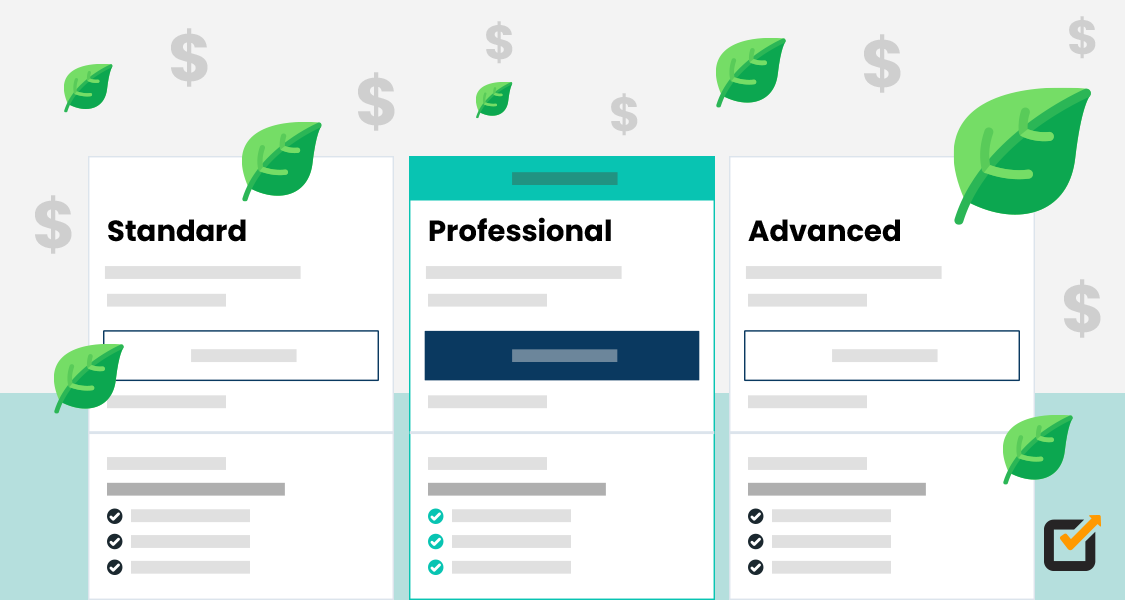Selling real estate isn’t just about listing a property and waiting for buyers to roll in. It’s about strategy, timing, and knowing exactly how to market your listings to the right audience.
A solid real estate marketing plan makes all the difference between a home that sells quickly and one that lingers on the market.
You’re already behind if your real estate marketing plan isn’t optimized for the digital era.
From crafting irresistible listings to leveraging targeted ads, the right approach can put your properties in front of serious buyers faster.
And with smart social media management tools, you can automate posts, track engagement, and ensure your listings get the attention they deserve—without spending hours manually updating every platform.
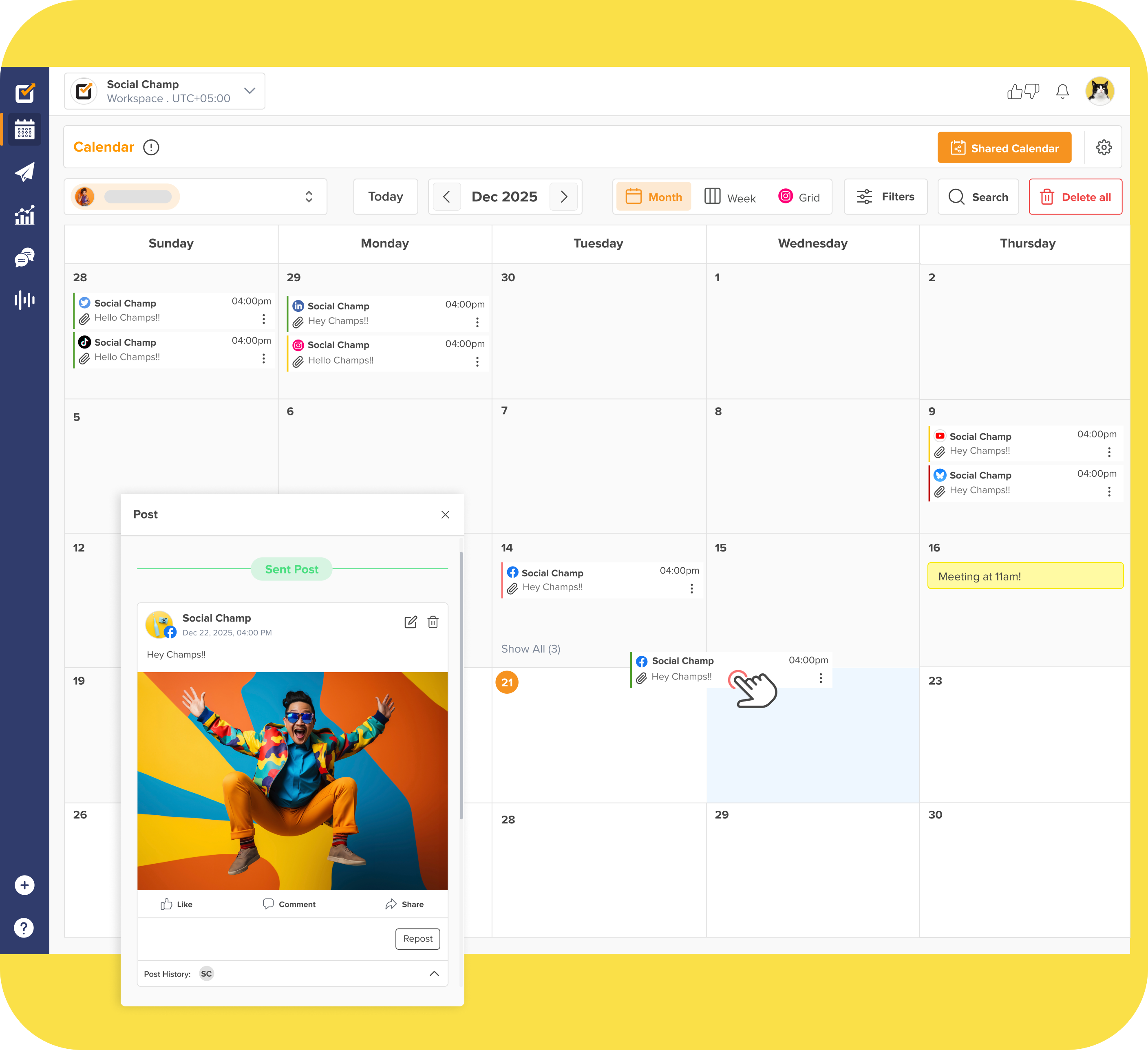
Real Estate Marketing, Made Easy!
From scheduling posts to tracking engagement, Social Champ helps you stay consistent and visible —all from one powerful platform.
Short Summary
- A real estate marketing plan helps agents attract buyers, build brand trust, and maintain a strong online presence.
- Key strategies include branding, social media, content marketing, SEO, paid ads, email marketing, and event marketing.
- Social media plays a crucial role in lead generation, engagement, and visibility for real estate professionals.
- Offline marketing tactics like open houses, direct mail, and community involvement still drive valuable local connections.
- Social Champ simplifies real estate marketing with AI-powered scheduling, automation, and analytics to boost consistency and engagement.
- A well-executed marketing plan for real estate ensures realtors stay ahead of competitors, generate quality leads, and close deals faster.
What Is a Real Estate Marketing Plan?
A real estate marketing plan is a comprehensive strategy that outlines how real estate professionals, including agents, brokers, and agencies, will promote their services and properties to attract potential buyers and sellers.
It includes everything from branding and content creation to social media outreach and paid advertising.
Without a solid plan, your efforts can feel scattered, leading to missed opportunities and inconsistent results.
A well-crafted marketing plan for real estate helps you stay ahead in a competitive market.
It ensures that your listings get the visibility they deserve, your brand builds trust, and your lead pipeline remains strong.
Featured Article: Social Media Audience Analysis: How to Understand and Engage Your Audience in 2025
What Are the Benefits of a Real Estate Marketing Plan?
The best real estate marketing plan does more than just promote your listings—it builds your brand, generates leads, and keeps you ahead of the competition.
Without a clear strategy, you risk blending in with thousands of other agents fighting for the same audience.
-
Targeted Approach
When you define your target market and understand their preferences, needs, and behaviors, you can tailor your marketing efforts to attract the right audience, increasing the likelihood of successful lead generation.
-
Consistent Branding
A strong brand identity is essential in the highly competitive real estate industry.
Your marketing plan for real estate should include strategies for building and reinforcing a cohesive brand image across all marketing channels, fostering brand recognition and trust among potential clients.
-
Lead Generation
The primary goal of the best real estate marketing plan is to generate qualified leads.
To attract potential buyers and sellers to your business, your plan should encompass a range of lead generation strategies, such as content marketing, social media marketing, search engine optimization (SEO), and paid advertising campaigns.
-
Efficient Resource Allocation
A marketing plan outlines specific marketing objectives, tactics, and budgets, ensuring that your time, money, and effort are allocated effectively, therefore maximizing your return on investment.
-
Measurable Results
A well-designed marketing plan helps you measure the success of your campaigns with the help of analytics tools.
Social Champ’s analytics feature, for example, helps you track important KPIs and metrics so you can make data-driven decisions and continuously optimize your strategies.

Get More Visibility With Social Champ’s Automated Posting!
Social Champ ensures your real estate marketing runs on autopilot, so you can focus on closing deals instead of managing content manually.
10+ Simple Steps to Build a Winning Real Estate Marketing Plan
A real estate marketing plan isn’t just about listing properties—it’s about building your brand, attracting the right audience, and turning leads into clients.
If you’re a realtor with no marketing experience, don’t worry. Follow these simple, actionable steps to create a real estate marketing plan that works.
Step 1: Define Your Brand Identity
Before anything else, you need to establish your unique value in the real estate market.
Are you known for luxury homes?
First-time buyers?
Commercial properties?
Defining your niche helps you target the right audience and build a recognizable brand.
Here are some key elements to focus on:
- Consistent Branding Across Platforms: Ensure that your brand’s visual elements, such as logos, colors, fonts, and imagery, are consistent across all platforms. This consistency helps reinforce your brand’s recognition and credibility.
- Logo Design: Your logo is the face of your brand, so it should be visually appealing, memorable, and reflective of your brand’s personality.
- Brand Voice and Personality: Develop a distinct brand voice and personality that aligns with your target audience’s values and preferences. This includes the tone, language, and messaging you use in your marketing materials, social media posts, and client interactions.
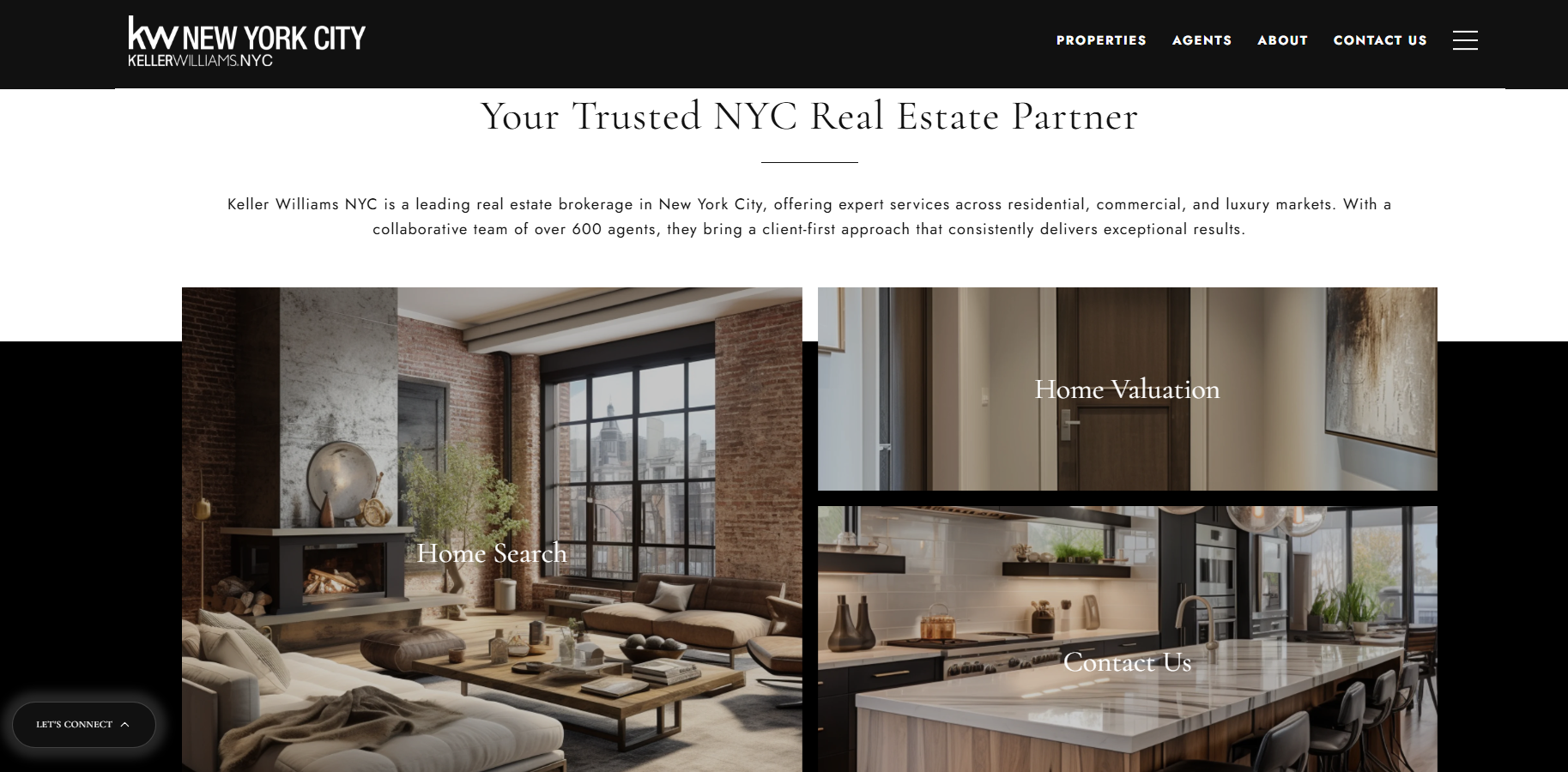
Website of a Real Estate Company
Step 2: Optimize for SEO
Your website is the foundation of your online presence. It’s where potential buyers and sellers will go to learn about your services, view listings, and contact you.
A poorly optimized website can cost you leads, while an SEO-friendly site can drive organic traffic and boost conversions.
Here are some key SEO strategies to consider:
- Keyword Research: Identify relevant keywords that your target audience is searching for. Use keyword research tools like Google Keyword Planner or Ahrefs to find high-volume, low-competition keywords to target.
- On-Page SEO: Optimize your website’s content, meta tags, and HTML elements with the identified keywords. Use them naturally in your page titles, headings, image alt text, and body content.
- Local SEO: Optimize your Google My Business listing with accurate information, photos, and reviews. Incorporate local keywords and location-specific content on your website to improve your local search rankings.
While it might seem confusing to you, the easiest way out is simply getting help from an SEO professional.
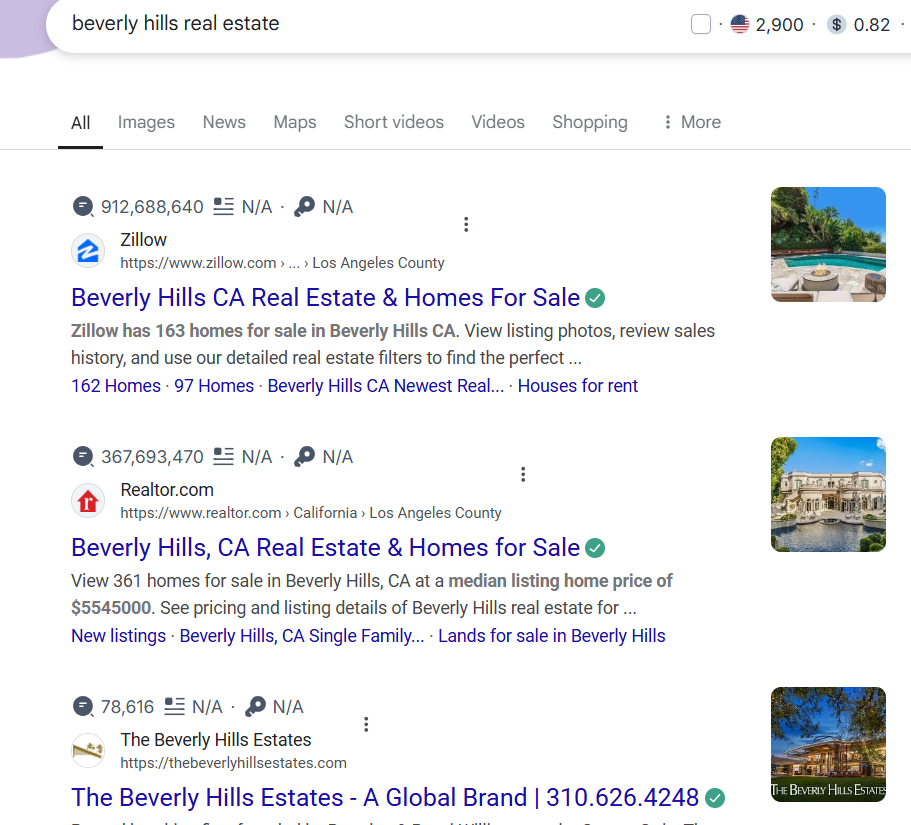
Step 3: Leverage Social Media Marketing
Social media is where your audience spends their time. It allows you to engage with potential buyers and sellers, showcase listings, and build brand credibility.
- Choose the Right Platforms: Start by identifying the social media platforms where your target audience is most active. Popular choices for real estate include Facebook, Instagram, LinkedIn, and Twitter.
- Post Engaging Content: Create a content calendar and consistently share valuable, visually appealing content.
- Leverage Influencers: Collaborate with local influencers, such as home decor enthusiasts, interior designers, or real estate bloggers. Influencer marketing can help you tap into new audiences and add credibility to your brand.
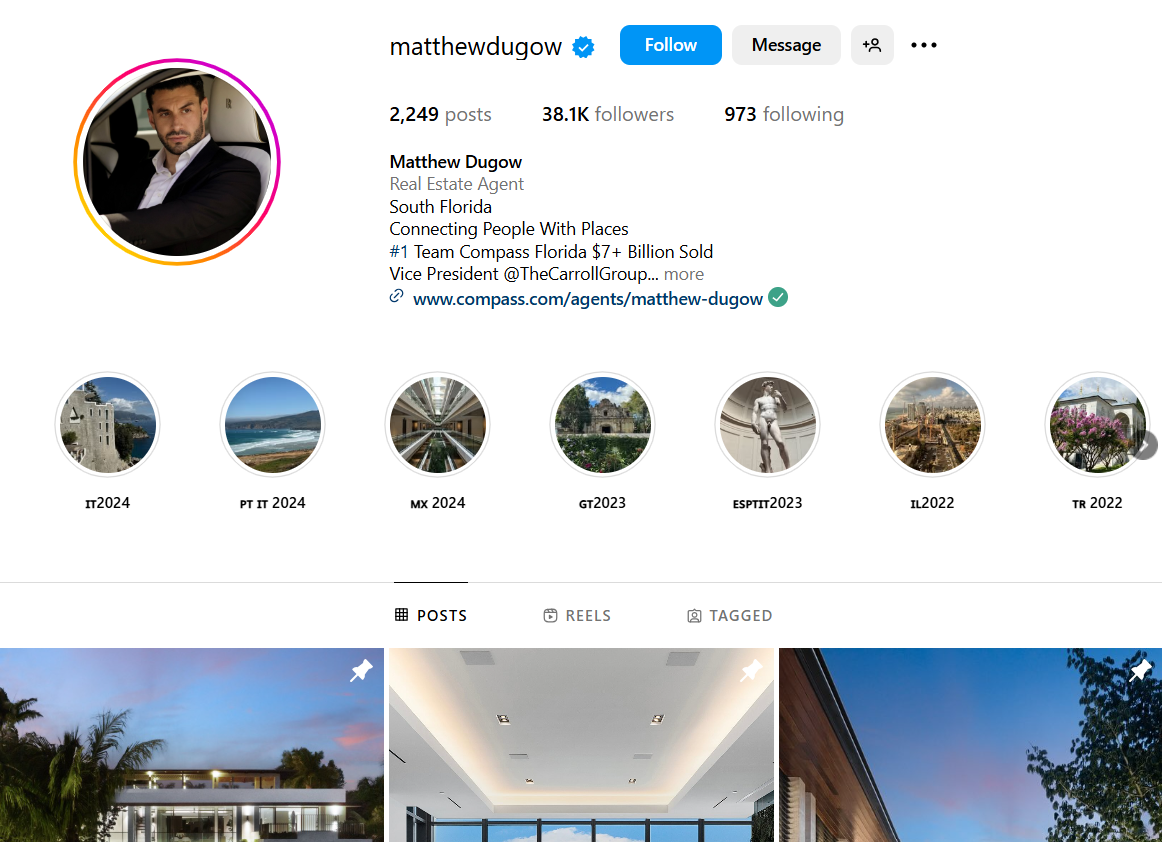
Real Estate Agent Matthew Dugow’s Instagram Account
Now, although social media marketing is not as difficult as SEO, it does require a lot of time and effort. But there’s a solution to this problem as well.
Social Champ helps you automate all SMM tasks including content creation, scheduling, publishing, and analytics.

Social Media Management Tool Made for Real Estate Agencies!
Social Champ lets you automate your daily SMM tasks with powerful scheduling, in-depth analytics, and seamless team collaboration.
Step 4: Run Paid Advertising Campaigns
Paid advertising is a powerful tool for real estate professionals to reach a highly targeted audience and drive qualified leads.
It includes:
- Google Ads: Bid on relevant keywords and create compelling ad copy to appear at the top of search results, increasing visibility and driving traffic to your website.
- Meta Ads: Target ads on Facebook and Instagram to reach your audience.
- Retargeting Campaigns: These are an essential component of any paid advertising strategy. These campaigns target users who have previously interacted with your website or ads, keeping your brand top-of-mind and nurturing them further down the sales funnel.
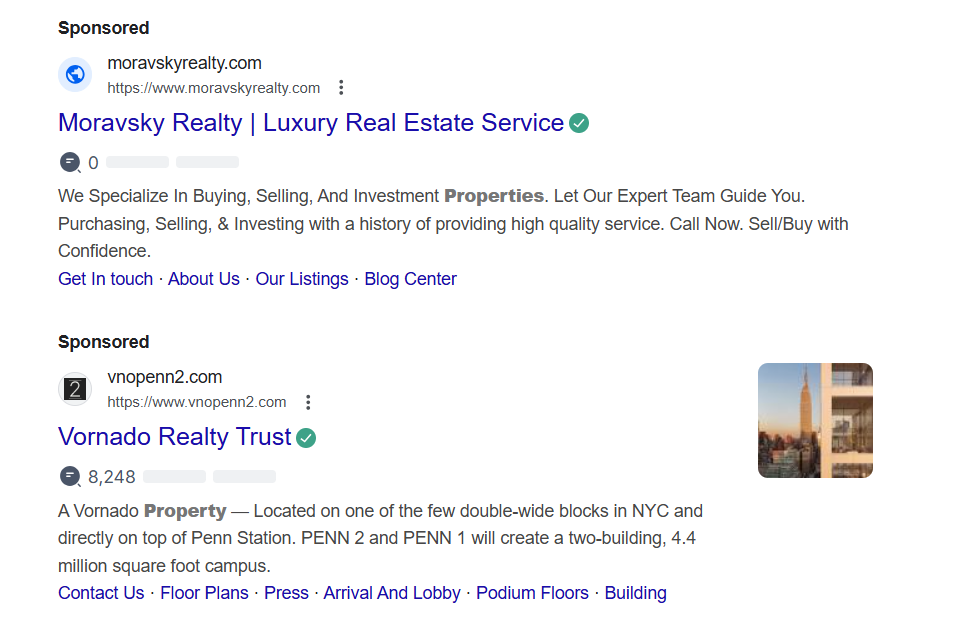
Example of Real Estate Google Ads
Step 5: Create High-Quality Content
Content marketing positions you as an industry expert and helps you attract leads organically.
An effective content marketing strategy includes:
- Blogging: With informative and engaging blog posts about topics related to buying, selling, or investing in real estate, you can demonstrate your expertise and provide value to your readers.
- Video Marketing: Create property tours, market updates, home buying/selling tips, or even educational videos on various real estate topics.
- Infographics: Infographics are a visually appealing way to present complex information in a digestible format.
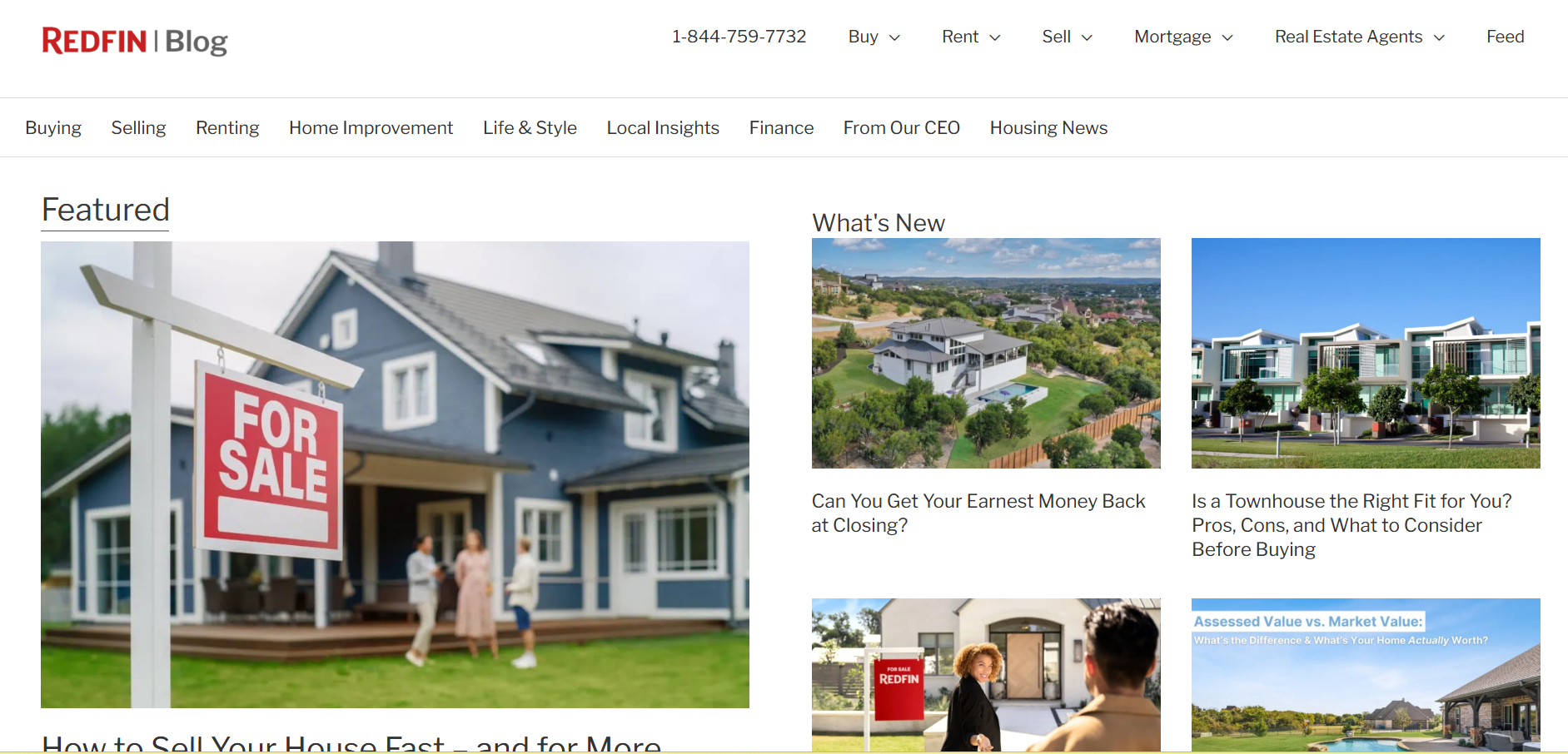
Blog Page of a Real Estate Company’s Website
Step 6: Utilize Email Marketing
Email marketing is an effective way to nurture leads, stay connected with past clients, and provide valuable updates to potential buyers and sellers.
It keeps your audience engaged and builds long-term relationships.
- Grow Your Email List: Start by actively growing your email list through various channels, such as your website, social media platforms, open houses, and networking events. Offer incentives like free home valuation reports or local market insights to encourage sign-ups.
- Nurture Your Leads: Nurture your leads by sending regular, valuable content tailored to their interests and stage in the buyer’s journey.
- Promote Your Listings: Craft compelling emails with high-quality visuals, detailed property descriptions, and clear calls to action to drive engagement and inquiries.
- Leverage Marketing Automation: Implement marketing automation tools like ActiveCampagin to streamline your email campaigns and ensure timely, personalized communication.
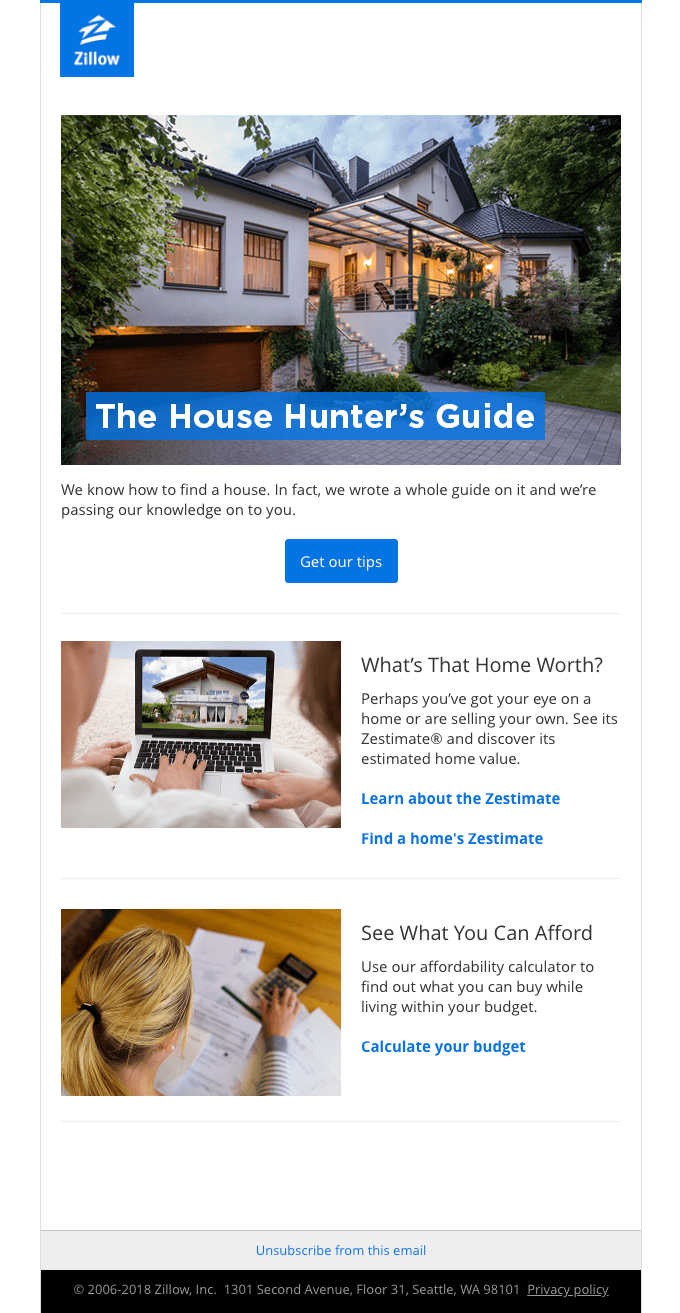
Email Marketing Example
Step 7: Engage With Online Reviews
Online reviews can make or break your reputation. Positive testimonials help establish trust, while a lack of reviews—or worse, negative ones—can drive potential clients away.
Here’s how to do it:
- Ask satisfied clients to leave reviews on Google, Zillow, and Facebook to build your credibility.
- Respond professionally to all reviews, both positive and negative, to show that you value client feedback.
- Showcase top reviews on your website, social media, and marketing materials to highlight client satisfaction.
Step 8: Utilize Offline Marketing Tactics
While digital marketing is crucial in today’s landscape, offline tactics still hold significant value in real estate marketing.
Incorporating offline strategies can help you reach a broader audience and establish a stronger local presence.
It involves:
- Open Houses: Open houses are a tried-and-true method for showcasing properties and attracting potential buyers. Ensure your open houses are well-advertised, and create an inviting atmosphere that highlights the property’s best features.
- Print Ads: Craft eye-catching ads that showcase your listings and expertise, and consider targeting specific neighborhoods or demographics.
- Direct Mail: Targeted direct mail campaigns can be an effective way to reach homeowners in specific areas or with specific characteristics.
- Community Involvement: Sponsor local events, volunteer for charitable causes, or participate in community organizations – this will not only help you connect with potential clients but also demonstrate your commitment to the area.

Picture of a Billboard With a Real Estate Agent’s Advertisement
Step 9: Host Virtual Tours & Webinars
Virtual tours and live webinars are a great way to engage potential buyers who may not be able to visit properties in person.
They allow you to showcase listings and answer questions in real-time.
How to do it:
- Use Zoom, Facebook Live, or Instagram Live to host virtual open houses and walkthroughs of new listings.
- Highlight key property features, answer audience questions, and provide expert advice on buying and selling.
- Record and upload virtual tours to your website and YouTube channel for future viewers.

Screenshot of Virtual Tour Posted on Instagram
Step 10: Leverage Event Marketing
Hosting events is a powerful way to build relationships. Events create memorable experiences and give potential buyers and sellers a chance to connect with you in person.
It involves:
- Real Estate Seminars & Workshops: Host educational sessions on home buying, investment strategies, or market trends. This positions you as an industry expert and attracts serious buyers and sellers.
- Property Showcases & VIP Open Houses: Organize exclusive property tours for high-value clients, investors, or realtors. Adding an element of exclusivity can generate buzz and demand.
- Community & Charity Events: Get involved in local festivals, charity runs, or neighborhood cleanups. This boosts brand visibility and builds trust within the community.

Instagram Posts about an Event by a Real Estate Company
Step 11: Track & Analyze Performance
Measuring your marketing efforts ensures you’re investing time and money into strategies that actually work. Regularly analyzing data helps refine your approach and improve results.
Follow these simple steps to track your performance:
- Use Google Analytics to track website traffic, lead sources, and user behavior.
- Monitor engagement on social media posts with Social Champ analytics to see what content resonates with your audience.
- Adjust your strategy based on performance data to optimize future campaigns.
- Regularly review your overall real estate marketing plan and readjust if needed.
Featured Article: How Content Localization Can Boost Your Social Media Strategy in 2025
How Social Champ Can Power Up Your Real Estate Marketing Plan
A best real estate marketing plan is only effective if executed consistently.
Social media plays a huge role in staying visible, building relationships, and generating leads—but manually managing multiple platforms can be overwhelming.
With Social Champ, real estate professionals can:
- Schedule Listings & Updates in Advance.
- Engage with Clients Effortlessly using the Social Inbox feature.
- Track Performance & Improve Strategy with AI-powered analytics.
- Stay Consistent with Automated Posting
Whether you’re an agent, broker, or agency, Social Champ makes real estate marketing simple, efficient, and results-driven—so you can focus on closing deals instead of juggling social media.

Social Champ Keeps Your Marketing on Autopilot!
Focus on closing deals while we handle your social media scheduling, content planning, and engagement tracking – Sign up now!
Conclusion
A well-structured real estate marketing plan isn’t just about listing properties—it’s about creating a brand, building trust, and staying ahead in a competitive market.
From crafting a strong online presence to leveraging social media, SEO, and paid ads, every step contributes to attracting and converting potential buyers.
But success doesn’t come from just having a plan—it comes from executing it consistently. That’s where automation tools like Social Champ make all the difference.
With AI-powered scheduling, analytics, and engagement tracking, you can streamline your social media efforts, maintain visibility, and generate leads without the daily grind.











